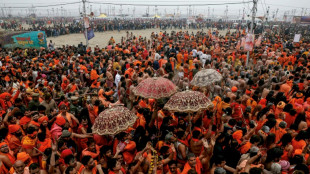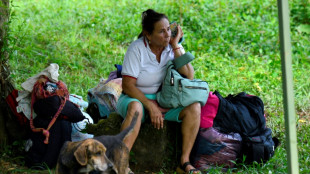

Protesters rally as Australian PM tours flood disaster
Scores of protesters in a flood-wrecked city in eastern Australia vented their fury Wednesday as Prime Minister Scott Morrison visited the heart of the disaster zone.
Demonstrators demanded more help and stronger climate action as Morrison toured Lismore, which endured some of the worst flooding in a near two-week deluge along the east coast that has killed 20 people.
"We need help!" protesters chanted as Morrison visited the city.
Many of them held placards with messages blaming the climate crisis including: "Coal and gas did this" and "This is what climate change looks like."
After the second major floods in a year, chunks of rubble and discarded, water-damaged furniture were piled high along the city's streets.
Many people had to clamber onto their corrugated metal roofs to escape the fast-rising water last week as floods peaked in the city in northern New South Wales.
Some waited for hours to be rescued by locally improvised boat patrols, emergency services vessels, or army helicopters as the waters surged around them.
Floodwaters across much of the east coast retreated as rainfall eased Wednesday but major flood warnings were still in force in some areas including at the Hawkesbury River west of Sydney.
Evacuation orders affecting about 40,000 people in New South Wales were in force in the morning. More than 90,000 people had been allowed to return to their homes.
Facing pointed questions at a news conference in the city, Morrison defended his government's climate record by stressing its commitment to achieving net zero greenhouse gas emissions by 2050.
- 'Like a bomb' -
"We are dealing with a different climate to the one we were dealing with before. I think that's just an obvious fact," Morrison said. "And Australia is getting hard to live in because of these disasters."
Morrison, who faces an election by the end of May, has underscored his support for coal-fired power stations to provide cheap electricity throughout their lifespans.
Even as the floodwaters retreat, the scars they have left on the landscape are widespread.
In Narrabeen, on Sydney's northern beaches, the rains caused landslides that cleaved chunks out of the hillside along residential streets.
Cleaning crews tried to clear away the mud and fallen trees on Wednesday.
"We've never seen it like this before and we have been here 25 years," resident Stephanie Brown said, walking along a muddy road with the family dog.
Her husband, Craig Brown, said a waterfall behind their house had been transformed into a torrent on Tuesday.
"The water that was coming down the side of the house was that strong that I had to hold on to a tree... it was bad," he told AFP.
Mid-morning the cliff behind his neighbours' house gave way, crashing into the backyard.
"We just heard this massive noise, it was like a bomb going off," Brown said, estimating that 20-30 tonnes of soil, trees and rock had collapsed.
The extreme weather had led the family to consider their safety living in the area.
- 'Scary' -
"It's making me think about do we stay or go. Maybe this isn't going to happen again for 20 years, but what if it happens next year? That's the scary thing," Brown said.
In response to the crisis in northern New South Wales, the prime minister said people in the hardest hit areas would receive triple the disaster payments being offered in other flooded areas.
The government is already providing Aus$1,000 ($US730) for adults and Aus$400 for each child affected by the floods.
This was in addition to a string of other financial measures including Aus$1 billion for grants being provided jointly by the federal government and the states of New South Wales and Queensland, he said.
Australia has been at the sharp end of climate change, with droughts, deadly bushfires, bleaching events on the Great Barrier Reef and floods becoming more common and intense as global weather patterns change.
E.Accardi--IM



